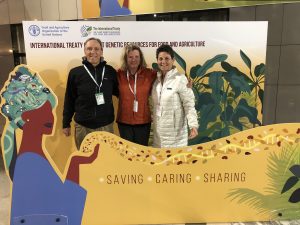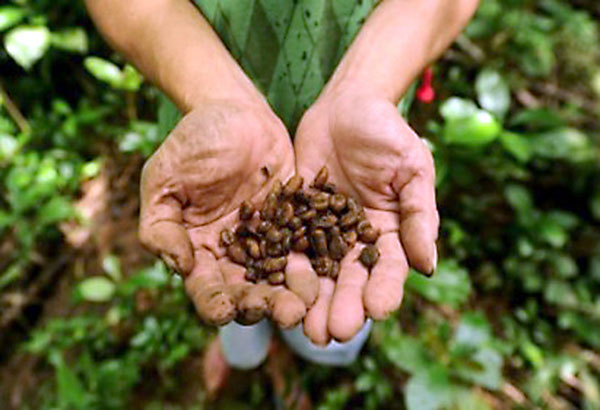By Belle Starr
When you reach for a juicy tomato or a beautiful head of  lettuce at your local farmer’s market, does it ever occur to you that the “local veggies” you are purchasing may not really be local. No doubt they are grown locally in local soil and hopefully in an organic manner but what about the seeds used to cultivate these delicious items?
lettuce at your local farmer’s market, does it ever occur to you that the “local veggies” you are purchasing may not really be local. No doubt they are grown locally in local soil and hopefully in an organic manner but what about the seeds used to cultivate these delicious items?
Interestingly seeds are at the center of a huge movement to re-localizethis important aspect of bioregional agriculture. Seeds selected from plants grown locally with attention to what species do best in what conditions generally yield better-adapted and more flavorful outcomes (selected for deliciousness!).
Currently over 60% of our seeds are owned by a small handful of  companies. Foremost among them is the German company Bayer who recently purchased Monsanto. Genetics culled from this seed stock is being used to do any number of things including genetic modification and to improve plant breeding. Although on the surface these ideas may sound simple they are actually extremely complicated.
companies. Foremost among them is the German company Bayer who recently purchased Monsanto. Genetics culled from this seed stock is being used to do any number of things including genetic modification and to improve plant breeding. Although on the surface these ideas may sound simple they are actually extremely complicated.
TheRocky Mountain Seed Alliance had the opportunity to attend the United Nations Eighth Session of the International Treaty (IT) on Plant Genetic Resources for Food and Agriculture in November in Rome. This was the 15th anniversary of the world’s attempt to get on the same page when it comes to sharing our most precious resource; seeds.
De legates came from over 150 countries and included “developed” countries and the “global south” as countries in India and Africa are now being referenced. Throughout the six days of deliberations, committees convened, side events were presented and discussions centered around smallholder farmers, increased access for the “global north” to more crops including wild crop relatives, and wild plants and what is known as digital sequencing information (DSI). The topics were as varied as the people attending and the anticipation of possible resolutions, in the midst of great decorum and civility was palpable. Unfortunately, many of the issues brought to this latest Treaty were not resolved. The next session will convene in New Delhi, India in 2021 to continue negotiations.
legates came from over 150 countries and included “developed” countries and the “global south” as countries in India and Africa are now being referenced. Throughout the six days of deliberations, committees convened, side events were presented and discussions centered around smallholder farmers, increased access for the “global north” to more crops including wild crop relatives, and wild plants and what is known as digital sequencing information (DSI). The topics were as varied as the people attending and the anticipation of possible resolutions, in the midst of great decorum and civility was palpable. Unfortunately, many of the issues brought to this latest Treaty were not resolved. The next session will convene in New Delhi, India in 2021 to continue negotiations.
Overall, the “developed nations” view indigenous communities and smallholder farmers as sources for seed genetics yet are not willing to offer compensation or acknowledge the traditional practices that have preserved these highly valued resources. When “help” is offered by the developed nations, it is often in the context of bringing farmers into a “citizen science” arena to focus on strategic breeding techniques and data collection that will benefit industry. CSOs (Civil Society Organizations) involved in the IT are suspicious of this model and offer support to smallholder farmers by giving them voices in the IT, and by defending their right to cultivate in ways that honor indigenous knowledge and their cultures.
Our participation in the 8th Session was a mutual awakening as we learned more about the direct challenges and threats to seed saving and farmers’ rights on the global playing field, and the international community learned about grassroots seed saving efforts in the U.S. Rocky Mountain Seed Alliance was part of a side event presented by our hosts, Community Technology Development Trust. What we witnessed was profound and alarming in many ways. We are now determining how to integrate the information we gained, and connections we made, into our programs. We would also like to host seed stewards from afar to join us at our seed schools and seed events as a form of a “global seed exchange” and we plan on establishing an international seed scholarship fund to enable this participation. There is much to share and learn from one another.



